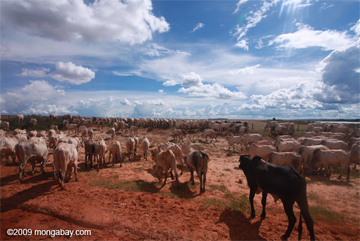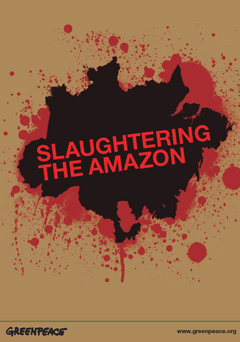Timberland, a maker of hiking boots and other footwear, today announced it would demand a moratorium on leather produced from newly deforested areas in the Amazon. The move is a direct response to pressure from Greenpeace, which last month released Slaughtering the Amazon, a report that linked some of the world’s most prominent brands to illegal clearing of the Amazon rainforest.
Timberland says it will require its leather suppliers to commit to the moratorium on newly deforested areas in the Amazon. Greenpeace says the policy “makes Timberland the industry leader in environmentally and socially responsible Brazilian leather procurement.”
 Cattle herd in the Brazilian Amazon. Photo by Rhett A. Butler. |
“Timberland has raised the bar for environmentally and socially responsible leather sourcing policies in the Amazon,” said Lindsey Allen, Greenpeace USA Forest Campaigner. “It has taken an important step by not only committing to avoid leather from cattle raised in newly deforested areas, but by working with existing suppliers like Bertin, to move the Brazilian cattle sector toward supporting a moratorium on any new cattle expansion into the Amazon Rainforest.”
Timberland’s announcement comes a week after Nike and Geox made similar commitments to not source any leather from the Amazon “until deforestation for cattle expansion is halted,” according to Greenpeace. Last month Brazil’s three largest supermarket chains, Wal-Mart, Carrefour and Pão de Açúcar, announced they would suspend contracts with suppliers found to be involved in Amazon deforestation.
 Download: Slaughtering the Amazon |
In the aftermath of the report, Bertin, the world’s largest beef processor, saw its $90 million loan from the International Finance Corporation withdrawn, while BNDES, Brazil’s development bank that funds many activities that drive Amazon deforestation, announced it will soon require processors to trace the origin of beef back to the ranch where it was produced in order to qualify for loans. Marfrig, the world’s fourth largest beef trader and one of the firms named in the report, said last month it will no longer buy cattle raised in newly deforested areas within the Brazilian Amazon. Meanwhile a Brazilian federal prosecutor has filed a billion dollar law suit against the cattle industry for environmental damage. Firms that market rainforest-tainted meat may be subject to fines of 500 reais ($260) per kilo.
Cattle ranching accounts for 80 percent of Amazon deforestation and is therefore one of the largest drivers of global forest loss.
Related articles
Nike implements policy to avoid leather produced via Amazon deforestation
(07/22/2009) Nike is working with Greenpeace to ensure its products don’t contribute to destruction of the Amazon rainforest, according to statements from the shoe giant and the environmental activist group. The partnership comes after Greenpeace report accused Nike of using leather derived from cattle raised on illegal deforested Amazon land. The report, “Slaughtering the Amazon”, also linked other shoemakers to rainforest destruction, including Adidas, Reebok and Timberland.
Brazil’s development bank to require beef-tracking system to avoid illegal Amazon deforestation
(07/01/2009) Responding to allegations that major Brazilian cattle producers are responsible for illegal forest clearing in the Amazon, Brazil’s development bank BNDES will soon require processors to trace the origin of beef back to the ranch where it was produced in order to qualify for loans, reports Brazil’s Agencia Estado. The traceability program aims to ensure that cattle products do not come from illegally deforested land.
Brazilian cattle giant declares moratorium on Amazon deforestation

(06/25/2009) Marfrig, the world’s fourth largest beef trader, will no longer buy cattle raised in newly deforested areas within the Brazilian Amazon, reports Greenpeace. The announcement is a direct response to Greenpeace’s Slaughtering the Amazon report, which linked illegal Amazon forest clearing to the cattle producers that supply raw materials to some of the world’s most prominent consumer products companies. Marfrig was one several cattle firms named in the investigative report.
Cattle giant JBS facing corruption probe
(06/17/2009) JBS, the world’s largest beef processor, is under investigation by Brazil’s federal prosecutor’s office for corruption, reports Reuters.
World Bank revokes loan to Brazilian cattle giant accused of Amazon deforestation

(06/13/2009) The Work Bank’s private lending arm has withdrawn a $90 million loan to Brazilian cattle giant Bertin, following Greenpeace’s release of a report linking Bertin to illegal deforestation of the Amazon rainforest, report environmental groups, Friends of the Earth-Brazil and Greenpeace. The loan, granted by the International Finance Corporation (IFC) in March 2007, was to expand Bertin’s meat-processing in the Brazilian Amazon. At the time, the IFC promoted the loan as a way to promote environmentally responsible beef production in the Amazon, although environmental groups — including Friends of the Earth-Brazil and Greenpeace — criticized the move.
Wal-Mart bans beef illegally produced in the Amazon rainforest

(06/12/2009) Brazil’s three largest supermarket chains, Wal-Mart, Carrefour and Pão de Açúcar, will suspend contracts with suppliers found to be involved in Amazon deforestation, reports O Globo. The decision, announced at a meeting of the Brazilian Association of Supermarkets (Abras) this week, comes less than two weeks after Greenpeace’s exposé of the Amazon cattle industry. The report, titled Slaughtering the Amazon, linked some of the world’s most prominent brands — including Nike, Toyota, Carrefour, Wal-Mart, and Johnson & Johnson, among dozens of others — to destruction of the Amazon rainforest for cattle pasture.
Nike, Unilever, Burger King, IKEA may unwittingly contribute to Amazon destruction, says Greenpeace

(06/01/2009) Major international companies are unwittingly driving the deforestation of the Amazon rainforest through their purchases of leather, beef and other products supplied from the Brazil cattle industry, alleges a new report from Greenpeace. The report, Slaughtering the Amazon, is based on a three-year undercover investigation of the Brazilian cattle industry, which accounts for 80 percent of Amazon deforestation and roughly 14 percent of the world’s annual forest loss. Greenpeace found that Brazilian beef companies are important suppliers of raw materials used by leading global brands, including Adidas/Reebok, Nike, Carrefour, Eurostar, Unilever, Johnson & Johnson, Toyota, Honda, Gucci, Louis Vuitton, Prada, IKEA, Kraft, Tesco and Wal-Mart, among others.
Beef consumption fuels rainforest destruction

(02/16/2009) Nearly 80 percent of deforestation in the Brazilian Amazon results from cattle ranching, according to a new report by Greenpeace. The finding confirms what Amazon researchers have long known – that Brazil’s rise to become the world’s largest exporter of beef has come at the expense of Earth’s biggest rainforest. More than 38,600 square miles has been cleared for pasture since 1996, bringing the total area occupied by cattle ranches in the Brazilian Amazon to 214,000 square miles, an area larger than France. The legal Amazon, an region consisting of rainforests and a biologically-rich grassland known as cerrado, is now home to more than 80 million head of cattle. For comparison, the entire U.S. herd was 96 million in 2008.